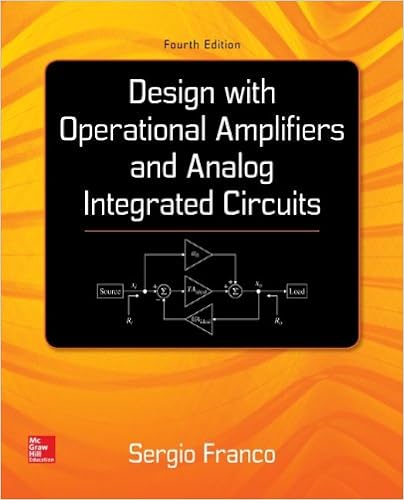
Free Downloads Design With Operational Amplifiers And Analog Integrated Circuits (McGraw-Hill Series In Electrical And Computer Engineering)

Design with Operational Amplifiers and Analog Integrated Circuits combines theory with real-life applications to deliver a straightforward look at analog design principles and techniques. An emphasis on the physical picture helps the student develop the intuition and practical insight that are the keys to making sound design decisions. This book is intended for a design-oriented course in applications with operational amplifiers and analog ICs. It also serves as a comprehensive reference for practicing engineers. This new edition includes enhanced pedagogy (additional problems, more in-depth coverage of negative feedback, more effective layout), updated technology (current-feedback and folded-cascode amplifiers, and low-voltage amplifiers), and increased topical coverage (current-feedback amplifiers, switching regulators and phase-locked loops).

Series: McGraw-Hill Series in Electrical and Computer Engineering
Hardcover: 736 pages
Publisher: McGraw-Hill Education; 4 edition (January 24, 2014)
Language: English
ISBN-10: 0078028167
ISBN-13: 978-0078028168
Product Dimensions: 7.3 x 1.3 x 9.2 inches
Shipping Weight: 2.7 pounds (View shipping rates and policies)
Average Customer Review: 4.2 out of 5 stars See all reviews (4 customer reviews)
Best Sellers Rank: #462,160 in Books (See Top 100 in Books) #143 in Books > Engineering & Transportation > Engineering > Electrical & Electronics > Circuits > Design #903 in Books > Engineering & Transportation > Engineering > Electrical & Electronics > Electronics #89994 in Books > Textbooks

A cursory examination of this book reveals a few disappointing errors that, to be fair, are common, at least in part, in other books on the subject:1) The author neglects to mention that the 741 has a typical gain of 200V/mV only at DC.2) The author incorrectly refers to the amplifier’s forward path gain “a” as the “open loop gain”. This is wrong because the open loop gain is, in fact, the gain round the opened feedback loop. Indeed, the open loop gain is more commonly referred to as the loop gain. A quick perusal of any feedback control theory textbook should disabuse doubters of this common fallacy.3) The author states, wrongly, that an op amp should ideally have an infinitely large gain. Never mind that an infinitely large forward path gain is not physically realisable, but this is false precisely because the error voltage required to drive the amplifier’s forward path, and, therefore, generate the output voltage, becomes zero when the forward path gain is infinite. This means the negative feedback would be completely unable to control the amplifier’s output voltage by controlling the error voltage which is permanently fixed at zero volts while the output saturates at one of the supply rails. Therefore, an ideal op amp should have a forward path gain which only approaches or tends to infinity without actually being equal to infinity.4) The author further states that the negative feedback delivers whatever voltage is required to drive the ideal op amp’s error voltage to zero. This is not true, even in the ideal case, because with a zero error voltage the forward path’s infinite gain will deliver an infinite output voltage.
Design With Operational Amplifiers And Analog Integrated Circuits (McGraw-Hill Series in Electrical and Computer Engineering) Design with Operational Amplifiers and Analog Integrated Circuits VLSI Design Techniques for Analog and Digital Circuits (McGraw-Hill Series in Electrical Engineering) McGraw-Hill's National Electrical Safety Code 2017 Handbook (Mcgraw Hill's National Electrical Safety Code Handbook) Operational Amplifiers and Linear Integrated Circuits (6th Edition) Principles of Transistor Circuits, Eighth Edition: Introduction and guide to the design of amplifiers, function generators, receivers and digital circuits McGraw-Hill's 500 ACT English and Reading Questions to Know by Test Day (Mcgraw Hill's 500 Questions to Know By Test Day) McGraw-Hill Nurses Drug Handbook, Seventh Edition (McGraw-Hill's Nurses Drug Handbook) McGraw-Hill's Conversational American English: The Illustrated Guide to Everyday Expressions of American English (McGraw-Hill ESL References) McGraw-Hill's I.V. Drug Handbook (McGraw-Hill Handbooks) Dynamic Offset Compensated CMOS Amplifiers (Analog Circuits and Signal Processing) Analog Methods for Computer-Aided Circuit Analysis and Diagnosis (Electrical and Computer Engineering) Design of Analog Filters 2nd Edition (The Oxford Series in Electrical and Computer Engineering) CMOS Analog Circuit Design (The Oxford Series in Electrical and Computer Engineering) Analysis and Design of Analog Integrated Circuits, 5th Edition Analysis and Design of Analog Integrated Circuits (4th Edition) Design of Analog CMOS Integrated Circuits Shigley's Mechanical Engineering Design (McGraw-Hill Series in Mechanical Engineering) Foundations of Analog and Digital Electronic Circuits (The Morgan Kaufmann Series in Computer Architecture and Design) Modern Digital and Analog Communication Systems (The Oxford Series in Electrical and Computer Engineering)



